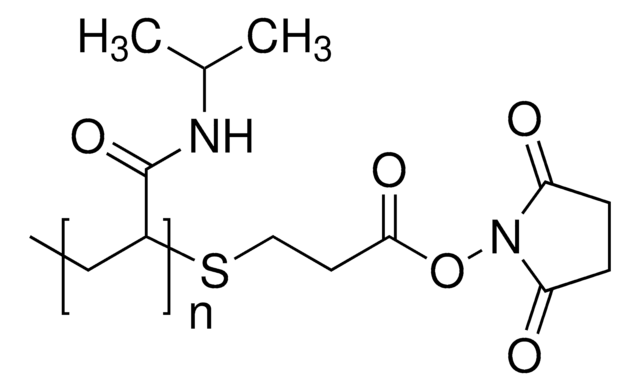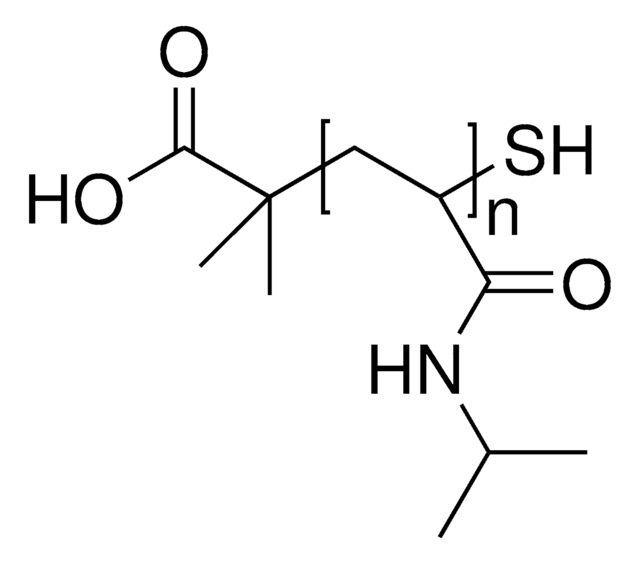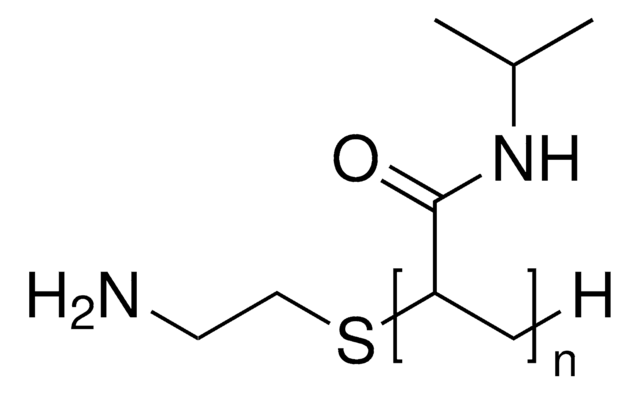900188
Poly(N-isopropyl acrylamide)
NHS ester end functionalized, average Mn 5,000
Sinónimos:
PNIPAM, polyNIPAM
Iniciar sesiónpara Ver la Fijación de precios por contrato y de la organización
About This Item
Fórmula lineal:
C8H10NO4(C6H11NO)nH
UNSPSC Code:
12162002
NACRES:
NA.23
Productos recomendados
Application
Poly(N-isopropyl acrylamide) (PolyNIPAM) is a stimuli-responsive polymer. This product features low polydispersity (PDI), which typically leads to better reproducibility in applications, and a terminal N-hydroxysuccinimide (NHS) functional group, allowing for rapid conjugation of biomolecules, small molecules, or other polymers. PolyNIPAM has been used in development of a variety of thermosensitive coated micro/nano materials, including thermoresponsive polymeric drug delivery systems.
Storage Class
11 - Combustible Solids
wgk_germany
WGK 3
flash_point_f
Not applicable
flash_point_c
Not applicable
Certificados de análisis (COA)
Busque Certificados de análisis (COA) introduciendo el número de lote del producto. Los números de lote se encuentran en la etiqueta del producto después de las palabras «Lot» o «Batch»
¿Ya tiene este producto?
Encuentre la documentación para los productos que ha comprado recientemente en la Biblioteca de documentos.
Yan Xia et al.
Chemical communications (Cambridge, England), 49(25), 2566-2568 (2013-02-21)
Site-specific protein conjugates with RAFT polymers were synthesized using expressed protein ligation. Stable micelles were formed from both linear block copolymer and Y-shaped conjugates.
Aniket S Wadajkar et al.
Acta biomaterialia, 8(8), 2996-3004 (2012-05-09)
New magnetic-based core-shell particles (MBCSPs) were developed to target skin cancer cells while delivering chemotherapeutic drugs in a controlled fashion. MBCSPs consist of a thermo-responsive shell of poly(N-isopropylacrylamide-acrylamide-allylamine) and a core of poly(lactic-co-glycolic acid) (PLGA) embedded with magnetite nanoparticles. To
A Gutowska et al.
Journal of biomedical materials research, 29(7), 811-821 (1995-07-01)
Biomer/poly(N-isopropylacrylamide)/[poly(NiPAAm)] thermosensitive polymer blends were prepared and their application as heparin-releasing polymer coatings for the prevention of surface-induced thrombosis was examined. The advantage of using poly (NiPAAm)-based coatings as heparin-releasing polymers is based on the unique temperature-dependent swelling of these
Umut Atakan Gurkan et al.
Advanced healthcare materials, 1(5), 661-668 (2012-11-28)
Stimuli responsive, smart interface materials are integrated with microfluidic technologies creating new functions for a broad range of biological and clinical applications by controlling the material and cell interactions. Local capture and on-demand local release of cells are demonstrated with
Shahrzad Rayatpisheh et al.
Macromolecular bioscience, 12(7), 937-945 (2012-04-27)
A new method for ultrathin grafting of pNIPAm on PDMS surfaces is introduced that employs plasma activation of the surface followed by thermal polymerization. This method is optimized for human primary SMC attachment and subsequent intact cell sheet detachment by
Artículos
Professor Mitsuhiro Ebara provides insights on several types of smart nanofiber mesh systems that have been explored for different drug delivery purposes.
Nuestro equipo de científicos tiene experiencia en todas las áreas de investigación: Ciencias de la vida, Ciencia de los materiales, Síntesis química, Cromatografía, Analítica y muchas otras.
Póngase en contacto con el Servicio técnico







